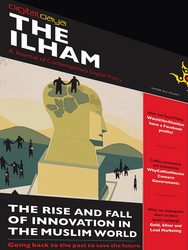Digital Policy Council Prescribes Social Media As A Means to Boost Growth and Governance
 The Ilham, A Journal of Contemporary Digital Policy, is a new publication that explores the transformation of governments in the 21st Century and the critical policy choices for those who lead them. In its first issue, the journal examines Islam and social media.
The Ilham, A Journal of Contemporary Digital Policy, is a new publication that explores the transformation of governments in the 21st Century and the critical policy choices for those who lead them. In its first issue, the journal examines Islam and social media.
The journal is published by The Digital Policy Council (DPC), an international, non-partisan “think tank” on 21st Century Governance. The Digital Policy Council is the research and public advocacy arm of Digital Daya (‘digital influence’), a new generation strategic consultancy that empowers leaders in the public sectors to leverage the new media of the Internet to communicate their message, build public influence, and execute high-impact programs to reshape governance and public policy.
Governance in the 21st Century Leaders in government and business from across the Islamic World are set to convene tomorrow in Kuala Lumpur, Malaysia for the 6th World Islamic Economic Forum (WIEF). Expected to attract an estimated 2,000 participants, the event has chosen the theme “Gearing for Economic Resurgence” as its headline. The conference spotlights the leadership challenges to achieve this agenda in the new century.
The WIEF converges at a time of a looming worldwide social change and unrest; an increasing demand for effective governance and communication between leaders and their people is a clear and present challenge for policy-makers that seek to shape public opinion and drive forward new economic policies.
The Ilham offers timely insights and a most useful reference to these world leaders; in particular its reports focus on Government 2.0, the application of new media technologies and social networking to the practice of government, as a means to address rising socioeconomic tensions between governments and their citizenry by reviving the lost tradition of entrepreneurship and innovation in the Islamic World. The report calls on governments to lead in enabling citizens and business to harness new technologies for building platforms to innovate and develop high-skilled human capital.
According to The Digital Policy Council’s most recent research, there are 225 million Muslims online today and with a compound annual growth rate of 30% that Internet population is expected to swell to one billion by 2015. While some leaders see this growing online influence as a threat and have pursued aggressive defensive measures against its expansion, there are others who recognize the Internet and its ever growing community as a tool for better governance and more impactful policy making.
A Role Model of Leadership One such progressive leader is the Prime Minister Of Malaysia, Datuk Seri Najib Razak, who strives to be connected with the people though his Facebook and Twitter accounts along with his blog www.1malaysia.com.my. Prime Minister Najib’s 1Malaysia program has a goal to preserve and enhance racial unity in the Muslim-majority nation of Malaysia among the many ethnic groups that make up its diverse population. The 1Malaysia website is intended “…to initiate an open and vital dialogue exploring our Malaysian identity, purpose, and direction.” The 1Malaysia Facebook profile has already attracted over 50,000 fans and the Prime Minister is ranked among the top ten heads of state who use Twitter for citizen engagement.
Prime Minister Najib’s 1Malaysia program is an assurance of new leadership for the nation and an inspirational model on next generation governance for the Islamic World.
It is quite fitting that Kuala Lumpur is hosting this year’s WIEF conference. Malaysia is regarded as a role model in the governance of Islamic banking and finance holding $86 billion in banking assets, 152 fund managers, and 63% of the global sukuk (‘Islamic bond’) market. Similarly, Malaysia has assumed a pivotal leadership role in the governance of the Islamic Halal certifications for food and consumer products establishing a globally recognized trust mark and the standard to beat for this trillion dollar industry.
At a time when governments around the world desperately need new solutions to deal with the immense challenges of “citizen engagement”, there is a window of opportunity for Malaysia to similarly take the pole position on 21st Century governance to provide the leadership necessary to deal with the many important aspects of social changes that will affect both Malaysia and the rest of the Islamic world in the near future.
The Ilham examines the policy options to achieve this end and advocates the use of social media as a platform for open government to create greater public value and to execute policies that are more inclusive of their citizenry and engaging of the global community.
Download the journal at http://www.digitaldaya.com/the_ilham About The Digital Policy Council™ The Digital Policy Council (DPC) is an international, non-partisan ‘think tank’ that promotes good governance and policy-making. The research and policy arm of the management consultancy firm Digital Daya™, DPC’s mission is the advancement of open discourse on issues of inclusive governance through the use of the Internet and Web 2.0.
Contact: The Digital Policy Council http://www.digitaldaya.com/ U.S. +1-202-379-4787 UAE +971-4-313-2086 Malaysia +60-3-2168-4201

